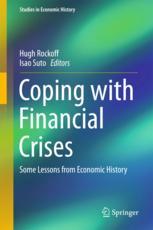

Most ebook files are in PDF format, so you can easily read them using various software such as Foxit Reader or directly on the Google Chrome browser.
Some ebook files are released by publishers in other formats such as .awz, .mobi, .epub, .fb2, etc. You may need to install specific software to read these formats on mobile/PC, such as Calibre.
Please read the tutorial at this link: https://ebookbell.com/faq
We offer FREE conversion to the popular formats you request; however, this may take some time. Therefore, right after payment, please email us, and we will try to provide the service as quickly as possible.
For some exceptional file formats or broken links (if any), please refrain from opening any disputes. Instead, email us first, and we will try to assist within a maximum of 6 hours.
EbookBell Team

4.7
36 reviewsThis edited volume is based on original essays first presented at the World Economic History Conference, Kyoto, Japan, in August 2015. It also includes three essays subsequently written especially for this volume. All of the essays focus on financial markets in the periods leading up to, during, and after financial crises, and all are based on new data and archival research. The essays in this volume enlarge the range of historical evidence on the causes and potential cures for financial crises. While not neglecting the United States or Britain, the usual focus of financial historians, it includes studies of financial markets in times of crisis in Japan, Sweden, France, and other countries to achieve a truly global and historical perspective. As a result of the research reported here the reader will be made aware of several neglected factors that have shaped financial crises including the most recent crisis. These factors are (1) the role played by monetary policy in causing and ameliorating crises, (2) the role played by international contagion in private financial markets in propagating financial crises, (3) the role played by variations in the institutional structures of financial markets in determining the impact of financial crises, and (4) the role played by the social background of the central bankers who must contend with financial crises in determining the final outcome.